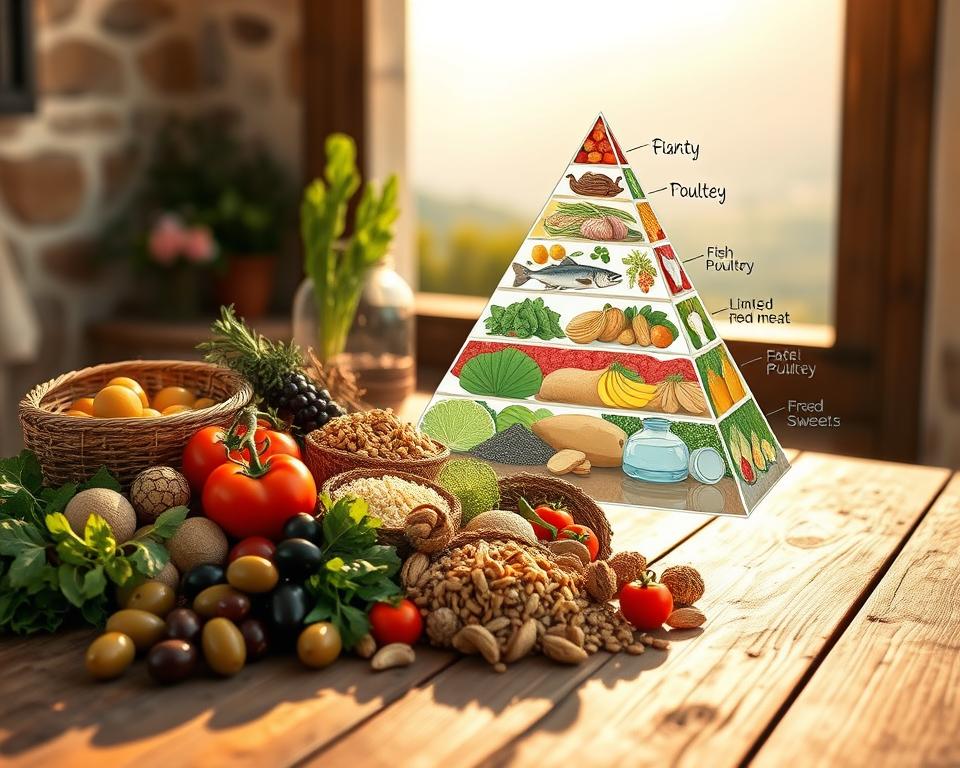Starting a healthier lifestyle is easy with the Mediterranean diet. It’s all about eating whole foods, fruits, and veggies. This helps keep your heart healthy and makes you live longer.
The simple Mediterranean diet is full of good stuff. By eating 12 common foods, you can feel better every day. These foods taste great and are full of nutrients that are good for your heart and help you live longer.
We wish you and your family to be healthy. Let’s look into the Mediterranean diet together. See how it can make your life better.
The Health Benefits of Mediterranean Eating
Mediterranean eating is good for your heart and helps you live longer. It’s been studied a lot for its health benefits.
Heart Protection and Cardiovascular Health
The Mediterranean diet is full of foods that are good for your heart. Foods like fatty fish, nuts, and olive oil are key. They help lower inflammation and improve heart health.
- Fatty fish high in omega-3 fatty acids
- Nuts and seeds rich in healthy fats and antioxidants
- Extra virgin olive oil, a primary source of healthy fats
Longevity and Anti-Aging Effects
The Mediterranean diet can help you live longer and look younger. It’s full of antioxidants and anti-inflammatory compounds. Foods like fruits, vegetables, and whole grains are important.
- Consuming a variety of colorful fruits and vegetables
- Incorporating whole grains into daily meals
- Using herbs and spices for flavor instead of salt
By eating this way, we improve our health and quality of life. It helps us “Get well and stay well.”

Mediterranean Diet Made Simple: Core Principles
The Mediterranean diet is simple and good for your health. It’s not about strict rules. It’s about living well.
The Mediterranean Food Pyramid
The Mediterranean food pyramid shows what to eat. It focuses on whole grains, fruits, veggies, and healthy fats like extra virgin olive oil. It says to eat these foods every day.
It also says to eat dairy, fish, and poultry in moderation. Red meat is eaten less often. This makes the diet sustainable and heart-healthy.

Why Simplicity Is Key to Sustainability
The Mediterranean diet is easy to follow. It uses whole, unprocessed foods. This makes it simple to keep up with over time.
It also values simple meal preparation and traditional cooking. This makes it easier to stick with the diet. And it’s good for your health.
By following the Mediterranean diet, you can eat well and stay healthy. Get well and stay well, Ray Baker.
The 12 Everyday Mediterranean Foods for Heart Health
Mediterranean foods are tasty and good for your heart. They are full of nutrients that help your heart stay healthy. Eating these foods can make your heart better.
1. Extra Virgin Olive Oil
Extra virgin olive oil is key in the Mediterranean diet. It has healthy fats that lower bad cholesterol. It also has antioxidants that fight inflammation. Using it in cooking helps your heart.
2. Fatty Fish (Salmon, Sardines, Mackerel)
Fatty fish are full of omega-3s. These fats reduce inflammation and lower bad cholesterol. Eating fish like salmon and mackerel keeps your heart healthy.
3. Walnuts and Almonds
Walnuts and almonds are good for you. They have healthy fats, protein, and fiber. They also have antioxidants that help your heart. Eating them daily is good for your heart.
4. Legumes (Chickpeas, Lentils)
Legumes like chickpeas and lentils are full of protein and fiber. They help lower bad cholesterol and control blood sugar. They make you feel full and are good for your heart.
5. Whole Grains (Farro, Bulgur, Brown Rice)
Whole grains like farro and brown rice are full of fiber and nutrients. They help lower bad cholesterol and control blood sugar. Eating them keeps your heart healthy.
6. Leafy Greens (Spinach, Kale, Arugula)
Leafy greens like spinach are full of vitamins and antioxidants. They help lower blood pressure and reduce inflammation. Adding them to your meals boosts your heart health.
Eating these Mediterranean foods can make your heart healthier. As Ray Baker says, “Get well and stay well” by choosing the right foods.
More Everyday Foods That Boost Longevity
Let’s keep exploring the Mediterranean diet. We’ll look at six more foods that help you live longer. These foods are full of nutrients and antioxidants, making life healthier and longer.
7. Tomatoes and Bell Peppers
Tomatoes and bell peppers are full of vitamin C and lycopene. Lycopene is good for your heart and can fight cancer. You can add them to salads or use them in cooking.
8. Berries and Citrus Fruits
Berries like blueberries and strawberries, and citrus fruits like oranges and lemons, are packed with vitamin C and flavonoids. These help your heart and immune system.
9. Greek Yogurt
Greek yogurt is full of probiotics and protein. Probiotics are good for your gut, and protein helps you stay healthy. It’s great as a snack or in dishes.
10. Herbs and Spices
Herbs like oregano, basil, and rosemary, and spices, are tasty and full of antioxidants. They make food better without salt or sugar.
11. Garlic and Onions
Garlic and onions are good for your heart. They have compounds that lower cholesterol and prevent blood clots.
12. Red Wine (in Moderation)
Red wine, drunk in small amounts, is part of the Mediterranean diet. It has resveratrol, which is good for your heart.
| Food | Nutritional Benefits | Health Benefits |
|---|---|---|
| Tomatoes and Bell Peppers | Rich in vitamin C and lycopene | Reduced risk of certain cancers and heart disease |
| Berries and Citrus Fruits | High in vitamin C and flavonoids | Improved heart health and immune system |
| Greek Yogurt | Excellent source of probiotics and protein | Supports gut health and maintains a healthy weight |
| Herbs and Spices | Packed with antioxidants | Adds depth to meals without salt or sugar |
| Garlic and Onions | Contains compounds that reduce cholesterol | Cardiovascular benefits |
| Red Wine (in Moderation) | Contains resveratrol | Heart health benefits |
Adding these foods to your diet can make you healthier and live longer. Stay well, Ray Baker.
Incorporating These 12 Foods Into Your Daily Routine
Adding the 12 key Mediterranean foods to your meals is easy. Just plan your meals and make a shopping list. This way, you can easily add these healthy foods to your life.
Simple Meal Planning Strategies
Good meal planning is key to a Mediterranean diet. Pick a day each week to plan your meals. Think about breakfast, lunch, dinner, and snacks. Use the 12 foods in your meals.
Start with Greek yogurt and berries for breakfast. Then, have grilled fatty fish with greens and grains for lunch. This makes your meals healthy and tasty.
Cook big batches of food to save time. Use leftovers to make new meals. Make a meal calendar to keep track of your plans. This helps you stay on track.
Mediterranean Diet Shopping List
A good pantry is important for Mediterranean cooking. Here’s a list to help you start:
| Food Category | Examples |
|---|---|
| Oils | Extra Virgin Olive Oil |
| Proteins | Fatty Fish (Salmon, Sardines), Legumes (Chickpeas, Lentils) |
| Nuts and Seeds | Walnuts, Almonds |
| Fruits and Vegetables | Leafy Greens (Spinach, Kale), Berries, Tomatoes, Bell Peppers |
| Grains | Whole Grains (Farro, Bulgur, Brown Rice) |
| Dairy | Greek Yogurt |
| Herbs and Spices | Oregano, Basil, Rosemary, Garlic |
Start your journey to wellness today. We wish you well on your Mediterranean diet path.
Quick and Easy Mediterranean Recipes
Make your meals better with Mediterranean recipes. This diet is more than food. It’s a way to live healthy and feel good. We’ll show you simple recipes with the 12 power foods.
Breakfast Ideas Using the 12 Power Foods
Begin your day with a healthy breakfast. Try Greek yogurt with honey and walnuts. Or scrambled eggs with spinach and cherry tomatoes. These are tasty and full of nutrients.
Lunch and Dinner Combinations
For lunch or dinner, try grilled salmon with quinoa and veggies. Or a lentil soup with oregano. These meals are tasty and easy to make.
Healthy Snacks and Desserts
Craving something sweet? Try almonds and dried fruits. Or make a dessert with Greek yogurt and honey. These are yummy and good for you.
| Meal Type | Recipe | Key Ingredients |
|---|---|---|
| Breakfast | Greek Yogurt Parfait | Greek yogurt, honey, walnuts |
| Lunch/Dinner | Grilled Salmon with Quinoa | Salmon, quinoa, vegetables |
| Snack/Dessert | Honey and Almond Snack | Almonds, honey, Greek yogurt |
Wishing you and your loved ones a path to wellness and a healthier lifestyle, Ray Baker.
Conclusion: Your Path to Mediterranean Wellness
Starting the Mediterranean diet is a step towards a healthier life. It includes 12 everyday foods that help your heart and make you live longer. Begin with small steps, like using extra virgin olive oil or eating walnuts and almonds.
Keep it simple as you move towards Mediterranean wellness. Eat whole grains, leafy greens, and fatty fish. Also, enjoy fruits and veggies. These easy changes will help you feel better.
Ray Baker says enjoying your food is key to Mediterranean eating. This way, you’ll not only get healthier but also love your food more. Make the Mediterranean diet a daily part of your life to stay well.
FAQ
What is the Mediterranean diet?
The Mediterranean diet is a way to eat. It focuses on whole grains, fruits, veggies, lean proteins, and healthy fats. These fats are found in extra virgin olive oil.
How does the Mediterranean diet support heart health?
It supports heart health by eating foods rich in omega-3s, antioxidants, and fiber. These help lower cholesterol and reduce inflammation.
What are some of the key foods in the Mediterranean diet?
Key foods include extra virgin olive oil, fatty fish like salmon and sardines. Also, walnuts, almonds, legumes, and whole grains like farro and bulgur.
Can I drink red wine on the Mediterranean diet?
Yes, but only in small amounts. Red wine is believed to have health benefits due to antioxidants.
How can I incorporate the Mediterranean diet into my daily routine?
Start by using extra virgin olive oil for cooking. Add more fruits and veggies to your meals. Eat fatty fish a few times a week.
Are there any Mediterranean diet shopping lists available?
Yes, there are lists. They include staples like olive oil, whole grains, canned beans, and fresh produce. This makes planning and shopping for healthy meals easy.
What are some simple Mediterranean diet meal planning strategies?
Plan meals around seasonal produce. Cook in bulk. Use herbs and spices to add flavor.
Can the Mediterranean diet help with weight loss?
Yes, it can. It focuses on whole foods and healthy fats. These can help you feel full and reduce hunger.
Is the Mediterranean diet suitable for vegetarians and vegans?
Yes, it’s great for vegetarians and vegans. It emphasizes plant-based foods like fruits, veggies, and legumes. It can be adapted to fit different diets.
How long does it take to see the benefits of the Mediterranean diet?
You can see benefits in a few weeks. Improvements in heart health and overall well-being are common. But, sticking to it long-term is best for the most benefits.
Ray Baker.


